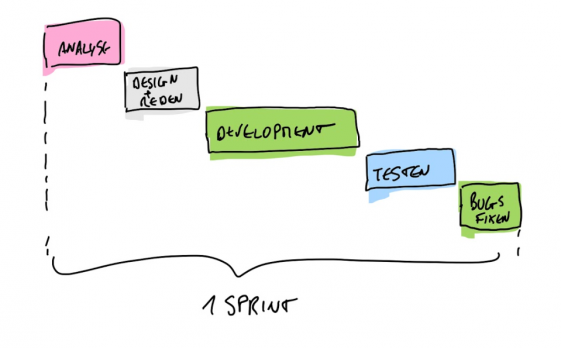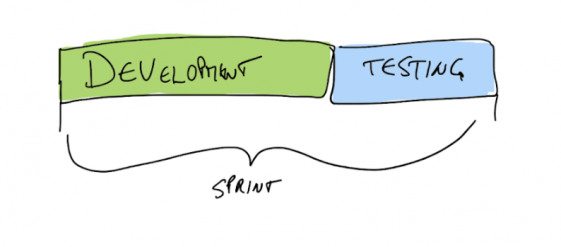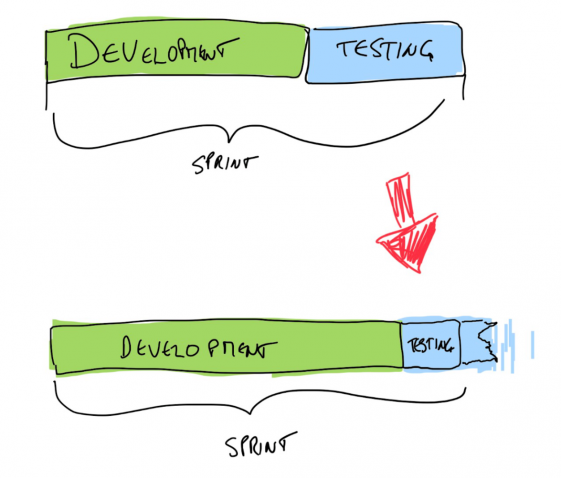
What is Scrum?
Scrum is a framework that helps teams work together. Much like a rugby team (where it gets its name) training for the big game, Scrum encourages teams to learn through experiences, self-organize while working on a problem, and reflect on their wins and losses to continuously improve.
While the Scrum I’m talking about is most frequently used by software development teams, its principles and lessons can be applied to all kinds of teamwork. This is one of the reasons Scrum is so popular. Often thought of as an agile project management framework, Scrum describes a set of meetings, tools, and roles that work in concert to help teams structure and manage their work.
Do you know what is effective in agile?
What I can often observe is that teams work in mini-waterfall mode.
That means in a Scrum Sprint they work in four or five phases.
It looks something like this:

The problem with this is that it only makes us work harder, but not smarter.
This means that we haven’t changed anything in the way we work, except that we might be bringing smaller pieces into production (which is a good progress). But it takes more than that to realize the advantages of agile software development. It needs a different approach.
Let’s focus on “testing”. This means that teams talk about “testing” (the role) and “testing” as a phase or task.
This looks like this:

Do you see the connection to the waterfall approach?
And do you see the problem that usually arises then?
In my experience, that’s what usually happens:
- “Ahh… we’re not quite done with development yet.”
- “Can you hold off on testing?”
- “Can’t you just test in the next Sprint while we’re still working?”
→. This should be the warning bell ringing by now.
That’s usually what it looks like as a visualization:

This means that the time for testing will be too short. Too little, done later, or tested in large batches (a lot at once), and that leads to blame, long test nights, late integration, bimonthly deployments, and general frustration.
10 Reasons to Build a Career in Scrum And Agile
Why Scrum? Why build a career in Scrum? There are some common questions that may arise in one’s mind while choosing a career. Scrum has the potential to renovate the software development and project management over every industry and business. You will be able to grow yourself as more agile i.e. learning how to react immediately and more meticulously to the necessary change that comes your way.
There are some reasons which will tell you why you should go for Scrum.
1. Transparency
Scrum team and stakeholders have the authority to know everything about the project. This visibility and transparency help the team members to identify the issues regarding the projects. Also, the face-to-face communication reduces the chances of miscommunication and also helps the team in the delivery of the product on time.
2. Reduction of Risk
The transparency in scrum helps to identify any kind of risk earlier and make it easier to respond to them. Risks are owned by Scrum master and his team member and reviewed by them time to time. Thus, Scrum reduces the risk of failing a project.
3. Continuous improvement (Progression)
Scrum provides continuous progress by
- An open and honest communication among the team, customers, and stakeholders
- Using the information from daily scrum meeting
4. Efficiency
A professional scrum master provides a more enjoyable place to his team to work as he knows when people enjoy what they do, the quality of the work will be higher and a possibility for innovation is greater. Scrum improves the morale of team members in the following ways:
- Team members become more efficient, creative and innovative as they are a part of self-organizing and self-managing team
- Scrum team is able to take decisions to build up a balance between their personal and professional lives
- Scrum master serves his team, removes obstacles and protects his team members from external interferences.
5. Flexibility
At the initial stage of the project, everyone wants 100% clarity that there will be no change required to make a product more valuable which is unlikely with the speed of change in the market today. So, change is required whenever needed. And, in agile development projects, change is accepted. The timescale is fixed for that and all the detailed requirements then help in the development of the product. There is need of a person who can understand this concept and will be able to take necessary decisions i.e. product owner.
6. Control and command on the project
Scrum team has various opportunities to control project performance and make corrections to create better products if needed because of the following practices:
- Adjusting priorities throughout the project at each sprint interval
- According to market demand, an embracing change is allowed by the project team
7. Increase in ROI (Return On Investment)
A decrease in time to the market is one of the main reasons that scrum project receives a higher return on investment. In addition to time-to-market benefits, ROI(return on investment) increases by using scrum because of the following reasons:
- Regular feedback through sprint reviews directly from stakeholders, including customers, enables project correction earlier which is less costly and time-consuming than later in the process.
- Reduces the cost of failure. If a scrum project is going to fail then it fails earlier and faster than waterfall projects.
8. Save your time and money
Using scrum, tasks are performed in a more systematized way that helps to save time and money. 20 minutes daily meet-up makes sure that the project is going well as planned at the starting of the project. This results in the early completion of the project with high-quality output by saving time and money
9. Easy to use
Scrum is an agile methodology or an approach which converts a complex problem into something that can be solved easily. Scrum can be easily introduced into an organization/company. Management of scrum is simple and easy to handles for all the stages.
10. Customer satisfaction
Customer satisfaction is an important task which is to be performed. Involvement of product owner, transparency, and flexibility to change whenever required provides customer satisfaction. Scrum team enables customers happier by following:
- Keeping them involved throughout the project.
- Having a product owner who is an expert on product requirements and customer needs
- Delivering the product to the customers faster and releases one product at a time instead of all at once





